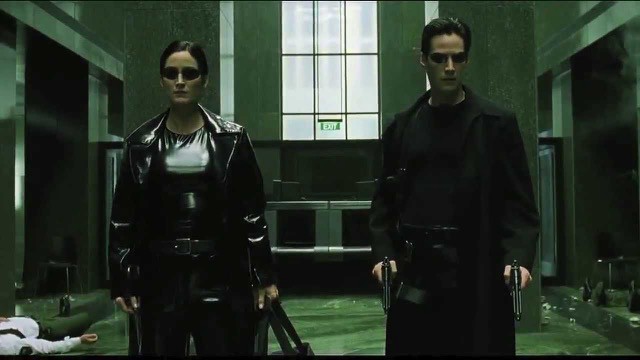Are We Part of the Problem?
By now, everyone has heard about the sequential massacres in El Paso, Texas and Dayton, Ohio. Different shooters, different locations, different motives, different weapons, but ultimately the same purpose: to take as many lives as possible. I’ve written about gun violence in entertainment before and I’m not going to add my two cents to the fray, aside from saying that I don’t expect the government to fix this problem. The failure lies with friends, family, and most importantly, the individual.
As is common after such unfortunately common occurrences is that society tries to identify contributing factors. Besides irrationally blaming the weapon, the media, the government, and the public often points to the glorification of violence which permeates our world, and American culture in particular. This is of course by design, where we the people are given conflicting messages for the sake of corporate profits. “Assault rifles should be banned. Now check out the latest Grand Theft Auto video game!” We see this intentional dissonance in numerous other advertising tracks: “Ladies, your bodies are perfect just the way you are! Now starve yourself to look like this model, who is obviously leading a much better life than you are.” “Being a parent is a dream come true! But why would you miss out on all the fun of your youth by having kids?” etc. etc. etc.

Image copyright Warner Bros.
It’s no stretch of the imagination that glorification of violence has its strongest effect on-screen. There is a visceral thrill in watching our hero mow down the enemy hordes with superior firepower and this sensory bonanza is best experienced on the big screen, and this is easy to latch onto as an instigating factor. Remember the outcry against The Matrix, which was released just a couple of weeks before the Columbine shooting? Black trench coats were as scary as assault rifles.
But what about books? As with movies and video games, pinning a massacre on a book is difficult and often unfair, but there have been some distinct connections between works of fiction and real-life slaughters. Some famous examples are the Oklahoma City bombing by Timothy McVeigh, who was inspired in part by the anti-government novel The Turner Diaries, as well as a number of school shootings and hostage incidents where the perpetrator was a known fan of Stephen King’s book Rage, written under the pen name Richard Bachman. Stephen King actually took that book out of print following the 1997 school shooting in West Paducah, Kentucky, where the shooter had a copy in his locker.

The question I’m leading up to is this: what is our responsibility as authors? Do we share any of the blame if our words put ideas into people’s heads or ignite the brittle underbrush that already exists in depraved minds and is just waiting for the spark? Personally, my books contain a wide range of violence, such as terrorist bombings, Satanic ritual slaughter, racist attacks, anti-Semitic massacres, public executions, domestic abuse, and more. How would I feel if someone directly referenced my books in connection with a similar act of violence? Honestly, I couldn’t say, though I would surely feel some degree of guilt. Yet there is a distinct line between the depiction of an action and the encouragement of an action. Yes, Neo and Trinity look “cool” as they march into an office lobby and blow everyone to pieces, but there is nothing that would make me want to commit a similar act, because I know that murder is wrong (and we don’t live in the Matrix, so this sort of action in real life would be actual murder). No one of sound mind would read the horrors that I describe in my books and think, “I think Mark is telling me go to out and do likewise.” Of course, it’s rarely people of sound mind that commit these horrific crimes, and in their warped perceptions, they may in fact feel that a particular book or movie was the catalyst for their explosive reaction.
So to answer my question in the title of this article, I would say, “No, as long as we walk by the Spirit.” As creative people, and Christian writers specifically, we have the unique charge of glorifying God in everything we do, and we must follow the guidance of the Holy Spirit through our conscience when we depict acts of violence. We should not revel in bloodshed, nor should we want anyone to come away from our books thinking that violence is cool, regardless of whether it is right or wrong. I know that I sometimes went too far in my own writing, but those mistakes are part of my writing journey and I would not want them to be whitewashed. As with all things, the main issue is the heart. Does what you write – and read – lead you closer to God?







































I don’t think we can blame any one thing. And if we want to ban books on the account that they could have a bad influence on someone, there are very few, if any, books that could stay in circulation. Even if a book (or anything really) is perfectly good and innocent, it can be used in a bad way. Take fandoms for example. My Little Pony is pretty clean, but from what I hear there are a lot of people that make extremely crass jokes, or very violent and perverted fan works. There was also a piece of software released as a reference for artists. It was basically for 3d mannequins that they could pose for referencing purposes. Some people started posing the mannequins in kinky ways, taking screenshots, and sharing them online. A lot of times it just really isn’t the fault of the product and more about how people respond to it.
Another question is if stories cause more harm or more good. It’s very upsetting to hear about mass shootings, but the vast majority of people have probably been influenced by media in positive ways, whether or not they realize it. And a lot of times, media can be violent without glorifying it. Fate Zero is very dark and violent, but depicts violence as a very bad thing. It shows the dark tragedy of the world, and how each of the chars deal with it. But maybe there’s cruddy people out there that would only focus on the violence and not the story’s message.
Authors should be conscious of how their work can affect others, but in most cases it wouldn’t make sense to hold them directly responsible. (especially when people want to shout Death Of The Author! And act as if the story is DEFINITELY saying something entirely different than what the author intended)
Stories might even be able to dig us out of this pit we’re in, as far as violence goes, by helping people learn that it’s wrong and all that. But it’s very hard to do that without discussing and depicting violence, and some people will still committ violence no matter what we do. But even then, though, simply finding a violent book in someone’s locker doesn’t mean that that was the direct/primary cause. The shooter could even use the book as an excuse, but in many cases it’s probably way more than that, such as having negative things and disappointments in their life. Or maybe they love violent stories because they were violent people to begin with.
This could branch out into other discussions, though. Should authors have to put trigger warnings and such in front of their books? That can only go so far, since it can be hard to know exactly what could trigger someone to committ suicide or whatnot.
Well, we know that El Paso was a racist sh*thead. Dayton is a bit of a puzzler, because besides being white, male, and a sh*thead, he didn’t leave much by way of clues. He liked anime and Bernie/Warren. Maybe he was an incel? I think someone would have mentioned that, because people like answers for questions like these.
Culture and media are interconnected, so it’s hard to blame one without the other. Culture influences media, and media influences culture.
Maybe, but the way it influences culture is so complicated. One mistake people seem to make sometimes is to look at one part of media and assume it only has negative effects, and then demand that it gets banned or tossed out.
In some ways it comes back to the issue that I mentioned earlier. People blame the media for depicting bad things, like violence. Media is a valuable tool for solving societal problems like violence, but it’s hard to critique issues like violence without allowing those things to be depicted and discussed…and any shows that discuss or depict this are at risk of being blamed for society’s ills.
Perhaps in some ways the popularity of more character driven stories can help. A lot of the more popular stories now days seem to be less about action and violence just for the sake of it and more about social issues and what’s going on in the chars’ heads and hearts.
So from that standpoint, even if a show is violent, it can help people learn more about the human condition and become better for it, have more compassion for others, etc. The only problem is that some of those stories will depict the thoughts and feelings of chars that make bad decisions, too. That’s important for helping people understand why bad things happen that way we can fix them, but some might still say such chars inspire bad people, whether or not that’s true.
Also…I don’t know. Can we really say the violence is part of our culture? It really isn’t. Yeah, we depict it in the media, maybe we have some of the machismo types you rail against, but overall our society decries real life violence as a bad thing and doesn’t consider it culturally acceptable.
https://www.wonkette.com/fox-guest-mass-shootings-are-what-happens-when-boys-cant-have-manly-dreams-of-going-to-mars
https://www.businessinsider.com/deadliest-mass-shootings-almost-all-have-domestic-violence-connection-2017-11?fbclid=IwAR0opQkqGHQmfIWCZMycIKPjzfzASHg7mvs7EIOlx8Isxv1rS7nzWthzhEY
With that first article, it kind of looks like both sides of the issue are taking some things out of context or spinning them way out of proportion. With the second one…the domestic violence thing would probably be an indicator, rather than a direct cause or cultural issue. That would seem like a kind of obvious thing, though, or at least not a surprising one. If someone goes out on mass shootings, would it really be surprising to learn that they were hurting other people before then?
Something that came to mind just now, though… It isn’t necessarily just a matter of the present culture, but how each person interprets that culture. Or maybe even just what side of that culture the person sees. Like, I dunno, one person might have examples of how our culture suppresses masculinity in a negative way, and thus interprets our culture through that lens. But another person might not have those examples and thus interprets our culture differently.
Some truly evil people twist scripture passages to justify their wickedness. Satan did this when he tempted Jesus.
Now if I wrote a manifesto saying, “Please murder Group X,” that would be a wicked thing to do even if no one carried out this idea.
On the other hand, people murder because of the wickedness in their own hearts. They will be held accountable regardless of murderous manifestos that inspired them. Or goofy comic strips. Or the Word of God warped and twisted.
I read a story in which some kids decided it was OK to temporarily abandon their aunt’s dog in a quarry because Joseph’s brothers put him in a pit, and if it’s in the Bible it must be OK 😀